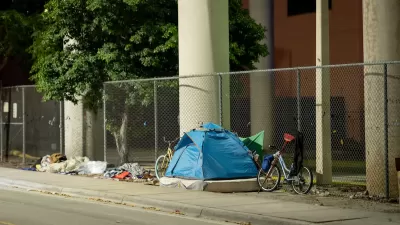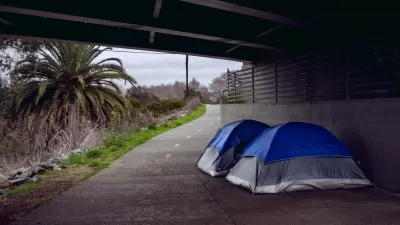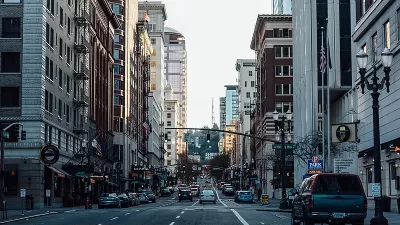Portland’s ‘aggressive’ new camping ban could threaten the city’s most stable community of unhoused people, the two-decade old, self-governing Dignity Village.

An article by Roshan Abraham in Next City describes the self-governed, city-sanctioned Portland community of Dignity Village, a village that was created more than twenty years ago in response to a growing homelessness crisis.
The article outlines the history of the village and the ways that it has remained resilient for so long. “A crucial aspect of the village model is that residents have agency, Ferry says. The spaces are voluntary; residents can leave and there are few barriers to entry. It is hard to imagine any of these approaches being replicated in the planned 6 mega encampments the city is looking to build.” According to Abraham, “Residents in Dignity Village pay $75 a month to live there and put in 10 hours a week of work on village business, which includes cleaning, maintenance and paperwork.” The village is not focused on rehousing, but provides a safe, organized space for people with few other options.
Now, the village’s future is threatened by an aggressive new anti-homelessness policy passed by the city earlier this month. “By forcing people off of the streets, the plan could mean the village, which currently has a modest waitlist of three people, could be overwhelmed with requests. It could also lead many of the city’s unsheltered population to be jailed, forced into congregate shelter or driven away from the city.”
FULL STORY: In Portland’s Self-Governed Dignity Village, The Unhoused Make Their Own Rules

Planetizen Federal Action Tracker
A weekly monitor of how Trump’s orders and actions are impacting planners and planning in America.

Maui's Vacation Rental Debate Turns Ugly
Verbal attacks, misinformation campaigns and fistfights plague a high-stakes debate to convert thousands of vacation rentals into long-term housing.

Restaurant Patios Were a Pandemic Win — Why Were They so Hard to Keep?
Social distancing requirements and changes in travel patterns prompted cities to pilot new uses for street and sidewalk space. Then it got complicated.

In California Battle of Housing vs. Environment, Housing Just Won
A new state law significantly limits the power of CEQA, an environmental review law that served as a powerful tool for blocking new development.

Boulder Eliminates Parking Minimums Citywide
Officials estimate the cost of building a single underground parking space at up to $100,000.

Orange County, Florida Adopts Largest US “Sprawl Repair” Code
The ‘Orange Code’ seeks to rectify decades of sprawl-inducing, car-oriented development.
Urban Design for Planners 1: Software Tools
This six-course series explores essential urban design concepts using open source software and equips planners with the tools they need to participate fully in the urban design process.
Planning for Universal Design
Learn the tools for implementing Universal Design in planning regulations.
Heyer Gruel & Associates PA
JM Goldson LLC
Custer County Colorado
City of Camden Redevelopment Agency
City of Astoria
Transportation Research & Education Center (TREC) at Portland State University
Jefferson Parish Government
Camden Redevelopment Agency
City of Claremont





























